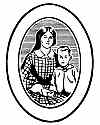|
Lavoisier laid the foundation for modern chemistry when he defined the chemical word "element." He discovered the composition of air and stated the guiding principle for modern research when he said "I wish to speak only of facts." Lavoisier was executed during the French Revolution but he left to the world a priceless volume - his "Elementary Treatise of Chemistry."  We are also indebted to another Frenchman who lived over a hundred
years ago for his pioneering work in photography - Louis Daguerre.
Daguerre combined the talents of a painter and a physicist, and to this
we can probably attribute his interest in obtaining permanent pictures
by the action of sunlight on certain chemicals. In 1839 he was
successful in his search - he discovered a process that produced a
picture that has become famous down through the years - the
daguerreotype.
We are also indebted to another Frenchman who lived over a hundred
years ago for his pioneering work in photography - Louis Daguerre.
Daguerre combined the talents of a painter and a physicist, and to this
we can probably attribute his interest in obtaining permanent pictures
by the action of sunlight on certain chemicals. In 1839 he was
successful in his search - he discovered a process that produced a
picture that has become famous down through the years - the
daguerreotype. In recent years motion pictures have dramatized the careers of two of the world's greatest scientists - Madame Curie and Louis Pasteur. No medium, however, can do justice to the contributions of these two citizens of France. Time only adds to their value. These are only a few of those French scientists whose names are on the roll of honor - just a cross section to show the versatility of a people. There are hundreds of others whose names should be mentioned today for their contributions to world progress. |








